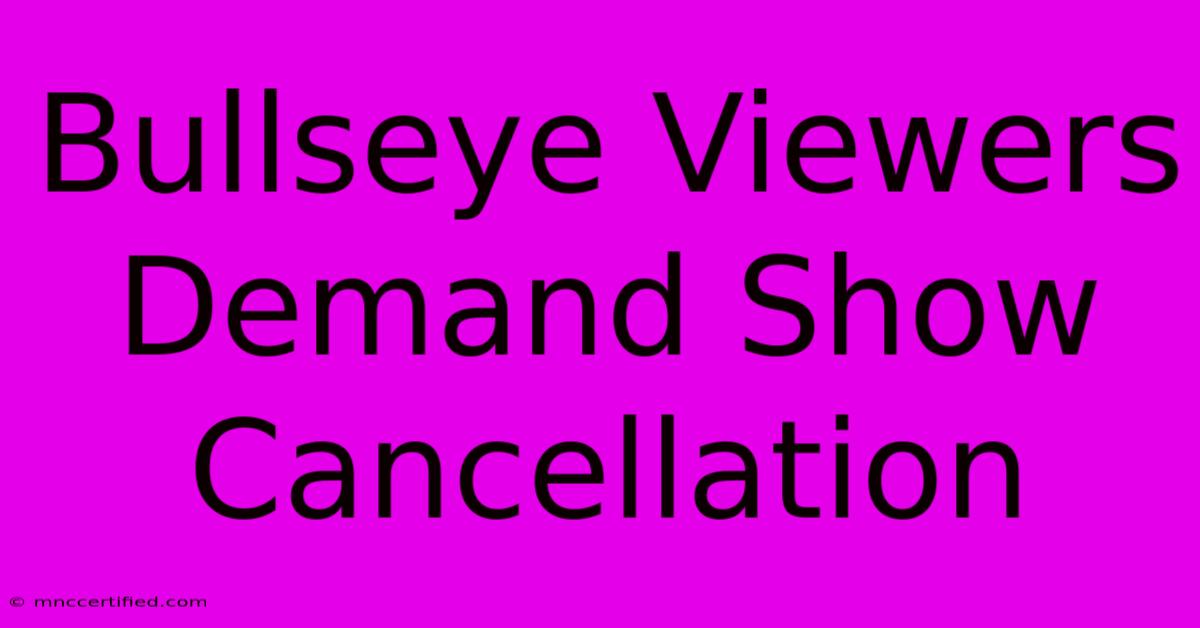Bullseye Viewers Demand Show Cancellation

Table of Contents
Bullseye Viewers Demand Show Cancellation: A Deep Dive into the Controversy
The popular game show, Bullseye, has found itself embroiled in controversy, with a significant portion of its viewership demanding its cancellation. This isn't a sudden outburst; rather, it's the culmination of several factors that have gradually eroded viewer trust and satisfaction. This article will dissect the reasons behind this growing demand, examining the criticisms leveled against the show and exploring the potential consequences for its future.
The Catalyst: Recent Controversial Episodes
Several recent episodes have sparked outrage among viewers, acting as the primary catalyst for the "cancel Bullseye" movement. These controversies revolve around several key issues:
Perceived Unfairness and Bias
A recurring complaint centers around perceived unfairness in game mechanics and judging. Viewers have cited instances where seemingly clear wins were overturned, or where favored contestants were given preferential treatment. This perceived bias, whether intentional or unintentional, has significantly damaged the show's credibility and fueled viewer frustration. The hashtag #BullseyeBias has gained significant traction on social media, highlighting specific instances and galvanizing viewer opposition.
Lack of Diversity and Representation
Another significant point of contention is the lack of diversity amongst contestants and the production team. Viewers have voiced their concerns about the underrepresentation of minority groups, arguing that this creates an exclusionary environment and reflects poorly on the show's values. Calls for increased diversity and inclusivity are growing louder, with petitions circulating online demanding changes in casting and production.
Controversial Host Behavior
The on-screen behavior of the host has also come under scrutiny. Accusations of unprofessional conduct, inappropriate comments, and insensitive jokes have emerged, further fueling the negative perception of the show. These accusations, amplified by social media, have contributed significantly to the growing calls for cancellation.
The Power of Social Media: Amplifying Viewer Voices
Social media platforms have played a crucial role in amplifying viewer discontent. Twitter, Instagram, and Facebook have become hubs for discussions, complaints, and organized campaigns against the show. The use of targeted hashtags like #CancelBullseye, #BullseyeMustGo, and #BoycottBullseye has allowed viewers to collectively voice their opinions and exert pressure on the network and production company.
The Network's Response (or Lack Thereof)
The network's response (or lack thereof) to the growing controversy has only intensified the situation. Silence from the network, or insufficient responses to viewer complaints, is often interpreted as a lack of accountability and concern, further fueling the anger and disappointment. This inaction has emboldened the "cancel Bullseye" movement, making it more organized and impactful.
The Future of Bullseye: A Precarious Position
The show currently finds itself in a precarious position. The sustained and organized viewer backlash poses a serious threat to its future. The network will need to address the core issues raised by viewers – the perceived unfairness, lack of diversity, and host behavior – to salvage the show's reputation and maintain its audience. Failure to do so could lead to the show's cancellation, a stark warning for other programs facing similar controversies.
Conclusion: Lessons Learned
The Bullseye controversy serves as a powerful reminder of the importance of listening to viewers and addressing their concerns promptly and effectively. In the age of social media, viewer dissatisfaction can quickly escalate into a full-blown crisis, highlighting the need for proactive measures to maintain audience trust and loyalty. The outcome of this situation will undoubtedly influence how other television networks handle similar criticisms in the future.

Thank you for visiting our website wich cover about Bullseye Viewers Demand Show Cancellation. We hope the information provided has been useful to you. Feel free to contact us if you have any questions or need further assistance. See you next time and dont miss to bookmark.
Featured Posts
-
Red Sea Us Navy Pilots Friendly Fire
Dec 23, 2024
-
Commanders Rally 27 21 Eagles Lead
Dec 23, 2024
-
Holiday Spirit Usag Okinawa Community
Dec 23, 2024
-
Christmas Travel Disrupted Belfast Airport Incident
Dec 23, 2024
-
Freddie Flintoff Age Wife Kids Cricket
Dec 23, 2024